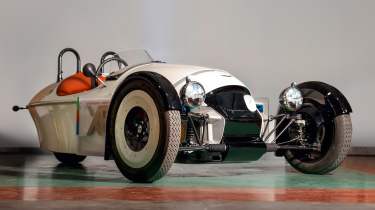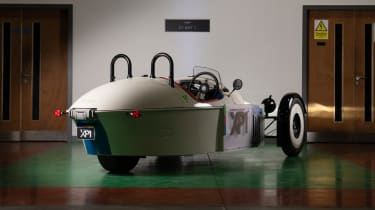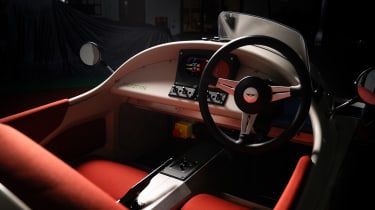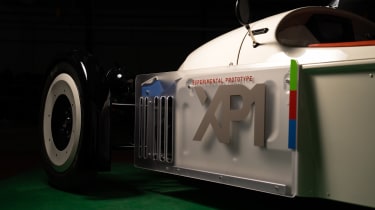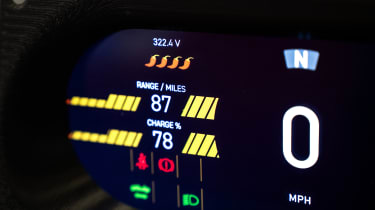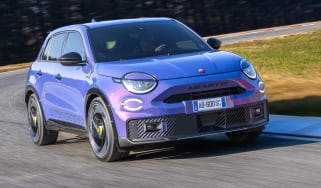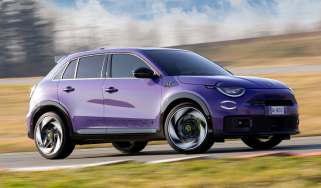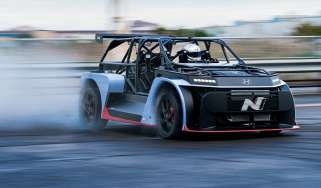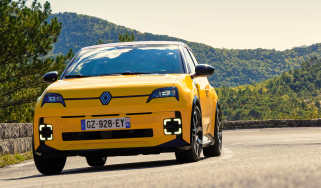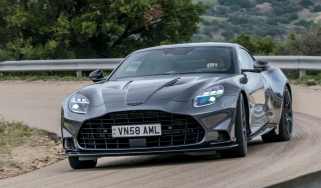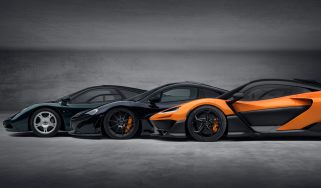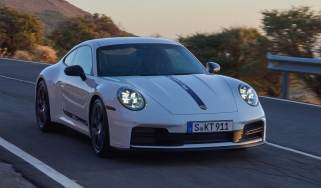Morgan is going electric, and it's built a battery-powered Super 3 to prove it
This experimental electric version of Morgan’s Super 3 promises to be more exciting to drive than the three-cylinder petrol car. We find out why
This is the XP‑1, an electrified version of the Super 3 three-wheeler that Morgan launched with a 1.4-litre, three-cylinder Ford engine under the bonnet. As its name suggests, XP‑1 is very much an experimental prototype, but as Morgan CTO Matt Hole talks us around it, it’s clear it has been put together with a level of EV expertise you might not expect to find at the UK’s most traditional sports car company. Perhaps equally importantly, given Morgans are meant to be fun, it’s also clear the team that built it has a passion for driving.
At a glance it looks just like a regular Super 3, but as well as having a 100kW battery in the nose instead of the Ford triple, a motor in the tunnel and an inverter where the fuel tank would be, the project has generated a number of other developments. These include much improved aerodynamics, the coefficient of drag dropping from 0.65 to 0.45, and a new chassis set-up. The chassis changes are not significant in themselves but the dynamics philosophy they help deliver is, because the handling will be more involving to compensate for the lack of gearshifting with the EV drivetrain.
> The Morgan Midsummer is a six-cylinder Pininfarina barchetta, with teak
‘The most important thing in developing Morgan EVs is that we try and make them as lightweight as we possibly can, from an electrification perspective,’ says Hole, ‘and that we retain a level of them being fun to drive. They’re the key elements. That does rely on having detailed requirements, knowing exactly what you want.’
When we visited Morgan last year to see how it intends to cope with the planned 2030 phase-out of new internal combustion engine cars, Hole had just been appointed to his role overseeing design and development. It’s hard to overstress what a significant signing he is. Before joining, Hole had worked for 15 years at Drive System Design, developing electrified propulsion systems for most of the major OEMs and also supplying the analysis tools to help them develop and refine their EVs. He was a founder of the business and a shareholder, but he’d always had roots in the area.
‘Joining Morgan was a once-in-a-lifetime opportunity,’ he explains. ‘I’m used to innovating in small teams and we have that here at Morgan, so the environment is very similar. My first year was getting an understanding of how Morgan works, improving quality and initiating some new models, one of which expands the Morgan portfolio, and the last six months has been starting the electrification journey and creating the first EV.’
That’s where Hole’s vast knowledge and experience can be brought to bear. Morgan could have outsourced the project or bought in an electrical architecture, but it didn’t want to inherit the constraints of someone else’s design. ‘We need to pick and choose the right parts and become master integrators. This project has basically been all about developing new skills and experience. We’ve built toolchains off the back of this project, software tools that allow us to develop and model the entire propulsion system for an EV, including all the thermal management systems. We can model performance events, predict range and take blocks from any manufacturer around the world, take efficiency maps, performance maps for an engine, an inverter, model different battery chemistries and try and understand from a cost and performance perspective what’s the best compromise.
‘Our toolchain has allowed us to pick a really cost-effective motor, a really cost-effective inverter, put them together and get the performance and efficiency that we were looking for. And then it’s allowed us to do some work on the motor control itself to get some of the dynamics in the response that we’re looking for. We’ve also tuned the motor and inverter sound on the dyno, augmented the natural sound. Some think it sounds like a Star Wars Podracer. Throttle demand shifts the amplitude, so you get audible feedback.’
XP‑1 is comfortably under 700kg, compared to 635kg dry for the ICE-engined Super 3, and while it’s heavier, the EV has twice the torque. A little extra weight in the nose helps with the dynamics too, says Hole. ‘With no gears to change, what we’ve tried to do is give your brain something else to do, to manage it down the road, including how it delivers the torque to the single rear wheel.’
The prototype has been running for about three months. ‘It’s already incredibly fun to drive,’ says Hole. ‘This is the bit of the project I’m emotionally attached to because I just love driving. I’m the first one to take the keys.’
The lead on dynamics is Tony Kiss, who comes to Morgan from Aston Martin. ‘He has a very strong background in ride and handling, has done a lot of concept development work at Aston Martin and is also a very keen racer,’ says Hole. ‘He’s really transforming the way we’re approaching the chassis. His experience has been invaluable.’
There was no desire to change the front tyres – those tall, slim, bespoke Avons – and there was no need either, because a few small changes to the front geometry has given a more positive turn-in. The car also uses Nitron dampers. ‘It’s a really high-quality damper that we can have valved exactly how we want,’ says Hole. ‘We’ve found that we can get a bit of extra spring rate for better turn-in without losing ride comfort.
‘What we are trying to do is introduce a small amount of rear slip. You drive it a little bit like you might ride a motorcycle, so you basically drive it into a corner quite hard, it turns very keenly, there’s a little bit of slip from the rear and you boot the throttle out of the corner and you have to manage the grip of the rear. If you drive it normally, it’ll behave quite normally, but get it by the scruff of the neck and it moves around quite easily.
‘We’re working on the balance, managing the breakaway with throttle control and tyre characteristics. Calibrating the EV drivetrain and pedal map ourselves, we can make the connection between the throttle and rear wheel do pretty much whatever we want, give it whatever characteristic we want. And we have guys out in Spain at the moment with four different rear tyres to play with, three from new suppliers.’
Currently there’s no production deadline for an electric Super 3. XP‑1 is purely experimental, a research and development project. The current drivetrain is oversized, because it’s simpler to downsize than upscale, and the Fellten-supplied battery isn’t the right type for production, but the results and the amount of learning are already very impressive.
Is an electric Super 3 what the market wants? It wouldn’t cost a great deal more, says Morgan, but if it was set to be simply an electric version of the ICE car you’d have reason to be sceptical. However, with a dynamic strategy that makes the EV sound even more fun to drive than the existing three-wheeler, there’s suddenly a lot more reason to be interested.
This story was first featured in evo issue 319.

